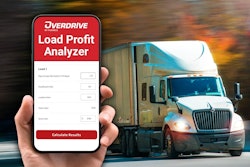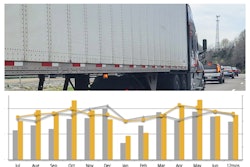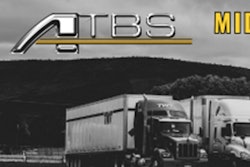As theft operations get more organized, more insidiously effective, cargo theft increasingly hits the headlines and even crosses into the wider public's consciousness.
For motor carriers and brokers and other logistics service providers (LSPs) responding to the American Transportation Research Institute's survey for the new “Fight Against Cargo Theft” report, researchers make clear that trucking businesses face an often uphill battle marshaling law enforcement resources in that fight after a theft occurs.
Prevention, though: All parties have at least a measure of control over it. As sophistication of organized rings' operation has grown online with so-called strategic theft through fraudulent communications hitting brokers and other LSPs hard, there's a role in prevention for what the National Motor Freight Traffic Association called "personal cyber hygiene" for individual owner-operators, among plenty more in the way of best practices for online business and communications.
ATRI's new report offered more top-line conclusions about cargo theft response that up the ante for truckers' efforts to double down on preventive measures.
- A large majority of carriers report cargo theft instances to law enforcement, yet only slightly more than half of brokers/LSPs do.
- Reality is that a large percentage (73.5%) of cargo stolen from motor carriers is never recovered, according to survey respondents.
- The cost-benefit of law enforcement involvement and investigation in the aftermath of a theft often comes out as a losing proposition for carriers.
Prevention thus ought to be goal No. 1 for truckers of all stripes. The new report underscores tried-and-true tactics, with some new wrinkles for owner-operators, fleets and brokers.

[Related: Prime time for cargo theft: $18M vanishing every single day]
First line of theft defense is looking out the windshield
Owner-operators/truck drivers are their own best first line of defense against would-be thieves. Carrier respondents to ATRI's survey recommended driver training for situational awareness and reasonable suspicion, along with clear shipment-specific instructions. Policies mentioned included the obvious, like removing keys from unattended vehicles and using team drivers for high-value loads to keep the rig in motion.
“It is a common technique that thieves will follow a truck from a location because they know what will be on board, and then at the first place it parks, maybe they break into the trailer,” said ATRI Vice President Jeffrey Short. “If you drive 200 miles, they’re certainly less likely to be following you for that distance.”
It's been a tried-and-true best practice, among others related to operational security, for many years gone by:
- Don't stop after leaving a pickup location for long distances (at least 200 miles) to avoid being followed from a facility by a would-be thief.
- Park in well-lit locations that have security and monitoring, and use only designated, overnight parking zones.
- Only drop trailers in a secure, fenced yard, and do not drop trailers overnight.
- Don't unhook a trailer if it isn't necessary.
- Back trailers against walls/other trailers to limit door access.
For company processes and policies, carriers recommended conducting routine security audits and compliance reviews, enforcing regular password changes for internal systems, using publicly available tools to vet customers and brokers, and more.
Among other recommendations was to review bills of lading and compare them against rate confirmations. If there are changes to the shipment details, such as a new delivery address written on the BOL, take load confirmation steps such as requiring an updated BOL directly from the customer/shipper.
Additionally, restrict access to your insurance information and certificates of insurance (COI).
[Related: Safeguard your trucking business’ certificate of insurance to avoid becoming an ID theft victim]
NMFTA publishes a cybersecurity best-practices guidebook geared specifically toward owner-operators and small fleet businesses that's available as a free resource via this link.
In terms of equipment-related prevention, carrier survey repsondents recommended all manner of padlocks, disk detainer locks and kingpin locks; custom trailer door seal covers; and manual air brake knob ("air cuff") locks. For company facilities: fencing, perimeter barriers, locked containers, all bolstered by lighting and surveillance systems such as closed-circuit television (CCTV) or onsite guards. GPS tracking, geofencing, and real-time monitoring systems were also reported to help carriers maintain good visibility of assets.
ATRI's report also outlined the necessity of a "security culture" across the entire supply chain, including among small fleet owners and operators, to fight cargo theft:
- Train drivers in theft prevention and situational awareness
- Promote awareness and accountability to all staff
- Provide support for driver vigilance (tools for verifying authenticity of documents and reporting suspicious activity)
- Create a company-wide security mindset or “security culture” across the supply chain
For company owners and representatives in a position to make a difference with respect to any of those measures, the rise of "strategic theft" underscores the need for collaboration among all parties along supply chains. While carriers are targeted with strategic theft far less often than brokers and other LSPs (20.3% of thefts for carriers and a whopping 62.5% for LSPs), recommendations from LSPs among survey respondents hold true for trucking companies, Short said. These include vetting the companies you’re working with -- carriers for LSPs, brokers and vice versa, and even shippers and receivers, for carriers.
“Communicate with all parties involved in a transaction,” Short said. “That means carriers, shippers, receivers, etc. And don't be afraid to ask questions … if you see something that's suspicious. Hopefully if you’re verifying the information, folks on the other side shouldn’t be upset with that, because it’s good to do this due diligence for the entire supply chain and make sure that a criminal element hasn’t crept in there.”
[Related: Beware double brokers: Getting involved with one can be a huge knock on credibility]
Reporting theft to law enforcement, insurance -- worth the hassle?
Most motor carrier respondents to ATRI's survey (82.2%) said they reported all of their cargo theft incidents to law enforcement, yet there was a small contingency of carriers (8.9%) that never did, though some among them had simply never experienced a theft. Conversely, just slightly more than half of brokers/LSPs reported all cargo theft incidents to law enforcement.
For motor carriers, the majority had no monetary threshold for whether or not they would report cargo theft to law enforcement, but those that do have a policy generally don’t report thefts with a value of less than $500.
Carriers who'd chosen not to report a theft in past indicated the minor financial impact of the theft, and considering the cost-benefit of the reporting and investigation effort, just didn't move the needle for them, as the cases were rarely resolved. In fact, ATRI found that a large percentage of cargo stolen from motor carriers (73.5%) is never recovered. Brokers/LSPs reported better success in recovery, with just 21.4% of thefts not recovered at all.
ATRI attributed the difference in part to the higher value of thefts from brokers/LSPs, who thus may have a greater financial interest in recovery. Additionally, since motor carriers’ largest theft category was pilferage of pieces of a load, “there is far less incentive to investigate small thefts, especially since their small size makes them less easy to track and recover,” according to the report.
Even fewer thefts are reported to insurance companies. Among carriers surveyed who'd been hit by a theft, just 56.3% said all thefts had been reported to their insurance company. A much smaller percentage of LSPs (36.4%) report all their cargo theft incidents to their insurance carrier.
More than a quarter of respondents in each category did not report any cargo theft incidents to insurance. A big reason might be obvious, given the cost of all manner of insurance premiums, including carriers' cargo insurance:
- Fear of insurance consequences -- Reporting was discouraged due to concerns over insurance cost or renewal.
- Below deductible/low value -- The theft was below their deductible or had a small financial impact.
- Administrative hassle -- Due to the administrative costs of reporting, some carriers will opt to avoid reporting.
“If something’s below deductible, low value, they’re not going to report it,” Short said. “And sometimes if it’s above the deductible, they might not. The biggest fear is insurance premium consequences.”
For all the challenges in investigating and prosecuting cargo theft cases, such fear might be a sizable barrier -- insurers motivated to assist with their own investigative resources could certainly be an ally if better trust existed around trucking. Looking beyond law enforcement and insurers to the courts, the ATRI report indicated carriers' perception of little interest within the judicial system for prosecuting cargo theft. Likewise; the notion that current cargo theft penalties are insufficient, limiting the system's capacity to combat the issue.
Legislative efforts could bear fruit in the states. Comprehensive anti-cargo theft tools developed through model state legislation could include three primary items:
- Designating cargo theft as a distinct crime. Short noted that “a lot of states treat it like a regular old theft,” but ATRI’s suggestion would designate cargo theft as a specific crime. That would allow for targeted legal definitions that can be used by prosecutors (such as stealing from a vehicle/trailer engaged commercially in moving cargo).
- Graduated sentencing for cargo theft. This would include specific dollar value ranges that define the severity of a cargo theft, as well as sentencing ranges (including minimum sentences) for stealing cargo at different value levels.
- State task force/advisory board. A state-designated advisory board or task force can formally bring key stakeholders together for information sharing and enforcement strategizing, and to develop public education programs to provide greater focus on the problem.
Almost all research participants, ATRI said, confirmed inadequate data-sharing across government agencies and between industry and government. Suggested as essential throughout the research was a federal-level centralized cargo theft reporting agency or program. This program might include “data collection, management, analysis, cross-jurisdictional cargo theft information sharing … all the way down to the smallest police departments up through state police efforts and even at the federal level,” Short said.
ATRI recommended an Information Sharing and Analysis Center (ISAC) devoted to cargo theft. ATRI said ISACs "have proven to be very effective in collecting and analyzing a range of relevant data, and distributing the analyses to targeted stakeholders associated with a specific industry or topic."
The research suggested that an ISAC focused on cargo theft could be formed between federal agencies, trucking industry stakeholders, and law enforcement at multiple levels.
Download ATRI's full report for more details on theft prevention strategies, the statistics behind cargo theft.
[Related: Driver held at gunpoint, cargo pilfered: How to avoid being an easy mark in dangerous times]











